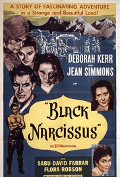
Directed by
Michael Powell / Emeric Pressburger
100 minutes
Rated PG
Reviewed by
Bernard Hemingway

Black Narcissus
Although badly dated in some respects Powell and Pressburger's film remains much-admired for its Oscar-winning Technicolor cinematography by Jack Cardiff and production design by Alfred Junge who together created a glorious image of a mountainous Northern Indian location entirely within London’s Pinewood Studios (there are a few location exteriors shot in the UK for the flashbacks). Nor will fans of P & P’s appetite for heightened emotionalism be disappointed by what amounts a perfect storm of frustrated femininity.
Deborah Kerr plays a young nun, Sister Clodagh, who is sent from her Calcutta convent to a remote region near the Himalayas in order to establish a school and hospital for the natives. But once there she finds herself estranged from the villagers' ways and having to deal with an unhelpful, British administrator, Mr Dean (David Farrar). Adding to her troubles she has been assigned the unhappy Sister Ruth (Kathleen Byron) who immediately falls for Mr Dean’s manly charms.
Based on a best-selling novel by Rumer Godden, Black Narcissus is not without evident flaws. The immediately obvious ones are the casting of English-born character actor May Hallatt as the old hag of a caretaker and a nuggeted Jean Simmons as a coquettish native girl as well as, in general, the Anglocentric view of the natives as “primitives”, “like children” and so on.
Then there is P & P’s characteristically British mix of self-satisfaction and obeisance. The former is embodied by Farrar’s Mr Dean, a kind of English rationalist’s alpha male who has no time for religious vapours and enjoys flaunting his robust frame at the nuns. Unfortunately most of the time one wishes he would put some clothes on whilst the sight of him riding a very small horse is oh-dear-me laughable. The diffidence is borne by Kerr’s sister superior who has dutifully accepted the post out of duty but doesn’t have the strength of personality to rally her compadres through their ordeal.
Kerr, who had starred in P & P’s The Life and Death of Colonel Blimp (1943), is largely hidden beneath her nun’s habit (she shines in the brief flashback scenes when she appears in civvies) with the directors keeping her as the still centre of the story. It is the other nuns, and Byron’s Sister Ruth, in particular who carry the weight of the action. This works well, however, in creating a palpable sense of sexual frustration and spiritual angst.
The high camp is a matter of taste but no-one will dispute the film's marvellous technical achievement,
Want something different?





